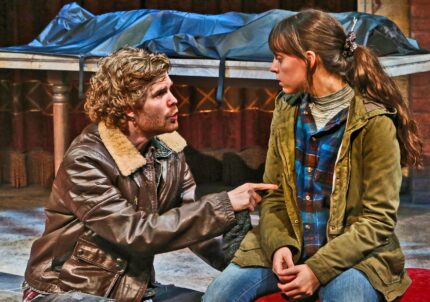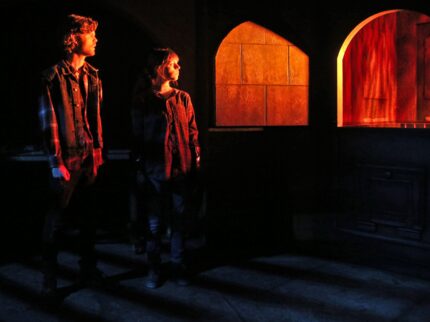
Nicholas-Tyler Corbin tries to connect with Georgi James in the Palm Beach Dramaworks’ premiere of The Science of Leaving Omaha / Photos by Tim Stepien
By Bill Hirschman
If the 1920s gave birth to The Lost Generation, then the 2020s saw the taking root of The Trapped Generation.
Palm Beach Dramaworks’ production of The Science of Leaving Omaha depict a world in which the traditional vision of The American Dream no longer exists as a viable possibility in the minds of a huge swath of 20-somethings and their younger siblings.
Not that they don’t have dreams; they desperately dream of a better life. But the scope of those dreams are heart-rendingly dispiritingly modest – not because they might not want more, but because life has taught them not to break their hearts daring to even hope for these tiny pittances.
In this premiere of Carter W. Lewis’ script, a quiet dark gallows humor threads throughout and the virtues of love, mutual support and sacrifice serve as the shaky lifelines or even excuses to seek escape. Regardless of their scruffy appearance, these are not slackers; these young denizens of this blue-collar world teeter on the cusp of hopelessness without ever quite falling into the abyss.
Fortunately for theatergoers, the two deeply flawed and troubled protagonists are written and directed and portrayed here in such a way that the audience connects and cares and roots for their last flailing Quixotic attempts.
And deeply buried without a lecture, Omaha is a quiet indictment of a society for which we all are responsible in its creation and perpetuation if only in our willful blindness and pointed neglect. These youths are the type of people that some supercilious Brahmin would advise to “just buckle down and lift yourself by your bootstraps,” when. in fact, that ship has sailed if it ever was available in port.
The set up in present-day Omaha occurs in the wee hours at a small dark basement crematorium of a low-rent funeral home with a body in a bag on a gurney awaiting processing the next day. Iris, an 18-year-old waifish gamin, is a kind of night watchman, locked in doing minor paperwork and under orders from her boss “Mrs. B” not to let anyone in.
Baker, an intensely upset 21-year-old with a difficult history breaks in through a window and wants to see the body. Indeed, he wants to talk to it. The dead is Ruth-Ellen, the woman he married 27 hours earlier and had been shot in an incident only a few hours ago. Not remotely clear himself quite what he wants at this moment, he quizzes Iris about every detail how the body will be dealt with. He often talks directly to Ruth-Ellen and when talking about her, sometimes refers to her in present tense.
Their plan was to immediately get on his motorcycle and go to Albuquerque to start a new life raising alpacas as a second chance. But first they had to make a stop en route and that’s when things turned tragic with police likely now searching for him.
Iris, too, has a deeply troubled past that she unveils a little at a time, but the core of which she never details. But the kind, widowed owner of the funeral home and a former crossing guard now working as the area’s security roamer apparently have rescued her and given her this meager second chance.
Now, as the two circle each other uncertainly, they reveal their attempts to escape. A high school dropout (perhaps not voluntarily) Iris is working on an essay that might get her readmitted to school.
She writes, “Omaha is no place to get a job either. I wanted to be a bagger at the Hy-Vee, but the retired folks got all the jobs, which ain’t surprising cause everyone thinks us kids are on meth or dope or worse-even—which is only partly true. Not even sure if I want to be a bagger anymore anyway cause an almost acquaintance of mine found a dead tarantula in the banana bin. Which is real surprising cause tarantulas are not indigenous to here; we are more a centipede-type municipality.”
And later, “Omaha has never smiled or waved at me. Mrs. B says there ain’t any middle to the country no more – no work for the working class and such – and if somebody does give you a wave, it’s probably to say goodbye, cause maybe their life is startin’ to look…way too much like yours.”
Baker says he tried to go to college wanting “to get a baseball scholarship at the university, but when I took the entrance exams – turned out my high school didn’t really teach me much.” He worked at a gas station where he met Ruth-Ellen who was running away from her wealthy family and a nightmarish sexual situation at work.
Until a week ago, Baker was a ward attendant at Lasting Hope Recovery Center working with “the young crazies… Break up fights, make ’em take their medicine, help ’em keep themselves away from themselves. Kids just like me, but with awful things in their heads.” Iris says she sure knows about that, but she moves on instantly to other matters.
Baker refuses to leave, even when security guard Sally keeps checking in outside the locked door. The slowly growing sense of comrades-in-the-foxhole builds as Iris instinctively covers for him by saying no one’s here when Sally inquires. But eventually, the situation begins to deteriorate until the vanishing options make everyone trapped in more immediate ways.
It’s theater, so you can forgive Lewis for the one well-crafted turning point speech that is rooted in an otherwise impossible-to-buy coincidence.
Lewis is well-known in the region for several readings and for full productions at the late Florida Stage with director Louis Tyrrell such as Golf With Alan Shepard, Women Who Steal, The Storytelling Ability of a Boy, The Cha-Cha of a Camel Spider and at Arts Garage, The Hummingbird Wars.
In this script, as with many of his we’ve seen, the setting is ostensibly naturalistic but the situation has a theatrically quirky spin to it which intensifies. His characters speak in a meld of everyday speech; parlance peculiar to the region, race or age; and the barest hint of poetic phraseology.
Iris occasionally uses three-syllable words that belie any stereotype, but then more than once Lewis gives her phrases like “super-duper” and when she is shocked “Holy kitchen full of cats… I almost vomited a tonsil right out of my face.”
But Lewis underscores the untapped depth in everyday people. Iris, trying to calm Baker, talks to the dead Ruth-Ellen about the process, unconsciously becoming almost lyrical: “And don’t you worry about the cremator, okay? This one night, when it was real quiet, I looked in there. It’s like a secret tunnel with rails and small flames about every foot or so to light the way. Looks like a road that’s gonna take you somewhere nice and far away. And that’s what I think happens. It’s gonna be just like you and Baker on that motorcycle, headin’ down a highway at night, but this time everything goes right.”
Lewis has skilled partners here: Bruce Linser, head of the Dramaworkshop, the troupe’s new play development unit, has smoothly directed this work and guided the cast through Lewis unusual style. Despite the bleak aura, he takes advantage of any opportunity for gentle humor and, miraculously, he never allows it to sink into a depressing vision of utter hopelessness.
All three actors disappear inside three-dimensional characters. Georgi James exudes Iris’ angst, anxiety and fear while struggling to escape with precious little confidence it can happen. Nicholas-Tyler Corbin’s Baker propels the evening as a driven bundle of twisted nerves being pushed inexorably by something he cannot define himself. The two create people who are not innocents yet somehow retain a buried quality that keeps the audience rooting for them. Merrina Millsap is the older Sally who has seen enough of these tragedies to be easily won over to help this duo.
With Linser’s oversight, the design work here is, as always, superb, no asterisks. Michael Amico has created a detailed grim environment, from the brick walls exposed through peeling paint to well-worn furniture used for family being counseled to the large ancient ornate steel door to the crematorium which dominates the scene as a reminder that death is always nearby.
His partners here include Roger Arnold’s sound with unnerving clanking and groaning inside the waiting crematorium. Lighting designer Kirk Bookman creates changing moods, but he delivers one coup de theatré: At one point, Iris opens the crematorium door for Baker to see is inside. The lighting effect is incredibly dramatic and almost impossible to describe.
Brian O’Keefe gives the actors the plaid shirts, ripped jeans and other accoutrements that perfectly define the characters.
This one of the five plays featured in last season’s New Year/New Plays Festival, It was originally commissioned by Washington University and produced there in November 2021 and then revised in Dramaworks’ development program including Zoomed readings.
Under Lewis and Linser, this is not as much of a downer as it sounds, so much as an admonishing report for the audience to consider on the ride home.
The Science of Leaving Omaha runs through Feb. 19 at Palm Beach Dramaworks, 201 Clematis St., West Palm Beach. Show times are 7:30 p.m., Wednesday, Thursday; 8 p.m. Friday and Saturday; and 2 p.m. Wednesday, Saturday, Sunday. Running times 135 minutes with no intermission. Call (561) 514-4042, or visit palmbeachdramaworks.org.










 A PaperStreet Web Design
A PaperStreet Web Design

One Response to No Exit: Dramaworks Bows Lewis’ Look At Blue Collar Youths’ Blocked Dreams